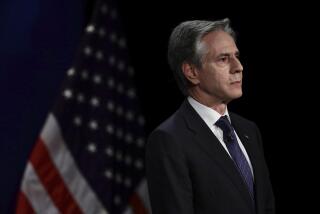Capitalism’s No Crime Now in Russia, but New Law Is Hazy
- Share via
MOSCOW — The capitalism that has flourished in Russia since Soviet communism died finally has the full blessing of the law. Five years after Russians started flocking to the streets to buy and sell foreign goods and currency, a new penal code has been introduced that makes such commerce legal.
Better late than never? In a country whose streets are packed with kiosks offering round-the-clock sales of every imported luxury from American vodka to Japanese computers, and where officials pocket huge bribes on contracts, it might seem so.
But lawyers, investigators and police have only contempt for the penal code, in force since Jan. 1. The first sweeping attempt to codify the piecemeal economic changes of the new era into a coherent statement of what is legal and what is criminal is, they agree, a failure.
“It’s astonishingly raw,” said Mikhail Slinko, head of the Moscow tax police’s investigative department. “There are too many factual mistakes. We all just groan at the thought of this new code.”
Russians have lived in legal limbo since the death of communism in 1991. Although the government encouraged them to join the new world of the market economy, the laws inherited from the Soviet Union still banned much of their economic activity.
The old laws were so irrelevant to post-Soviet life that even the police tended to ignore them. Confusion over what was legal gripped even the most honest Russians and worsened a crime wave that accompanied the injection of the first real money into the old command economy.
“The [new] code is an attempt to civilize Russia’s market,” said Alla Kazakina, a lawyer in the Moscow office of the U.S. firm Patterson, Belknap, Webb & Tyler. But she added: “While the code as a whole is a step in the right direction, it is far from the bold stroke needed to fight corruption endemic in Russia today.”
The weekly magazine Kommersant commented, “Now we can all freely buy and sell hard currency to each other at any exchange point right under a policeman’s nose. That’s good news.” But it went on to point out that the new economic crimes listed by the code are so ambiguously defined that it will be virtually impossible to bring wrongdoers to justice.
It has become a crime, for instance, to “illegally receive or disseminate commercial secrets”--but the code does not define what a commercial secret is. Copyright violations that are repeated or cause “great” damage are listed--but there is no clear definition of how much damage.
The code is just as vague about state-sector corruption, though it does newly recognize offenses regarding bribe-taking by officials. One makes bureaucrats criminally liable for giving out trading licenses without proper justification or for unwarranted restrictions on commercial activity. Bribe-taking in the private sector is recognized as a crime for the first time.
Trading without a license has become illegal. Money laundering by an organization “on a large scale” is now punishable by up to 10 years in prison and confiscation of property. But Kazakina says there is no definition of “large scale.”
Punishments are no more precise than crimes. They run from fines in multiples of Russia’s minimum wage--usually the equivalent of a few thousand dollars, which wealthy business people can easily pay--to “mandatory labor” to imprisonment. But an enforcement code defining mandatory labor has still not been passed; the deadline is not until 2001.
For many Russians, the latest offering by their lawmakers is only an ironic echo of a 19th century witticism: “The harshness of Russia’s laws is compensated for by the fact that no one need obey them.”
The new penal code has been a long time coming. Parliament members started discussing it in 1992, but their attention was repeatedly distracted by political crises and uncertainty about where legal limits should be set.
“At the start, parliamentarians were given different versions of the penal code to discuss. They made up this muddled compromise out of all of them. It was meant to suit everyone, but it suits no one,” said Slinko of the tax police.
More to Read
Sign up for Essential California
The most important California stories and recommendations in your inbox every morning.
You may occasionally receive promotional content from the Los Angeles Times.













